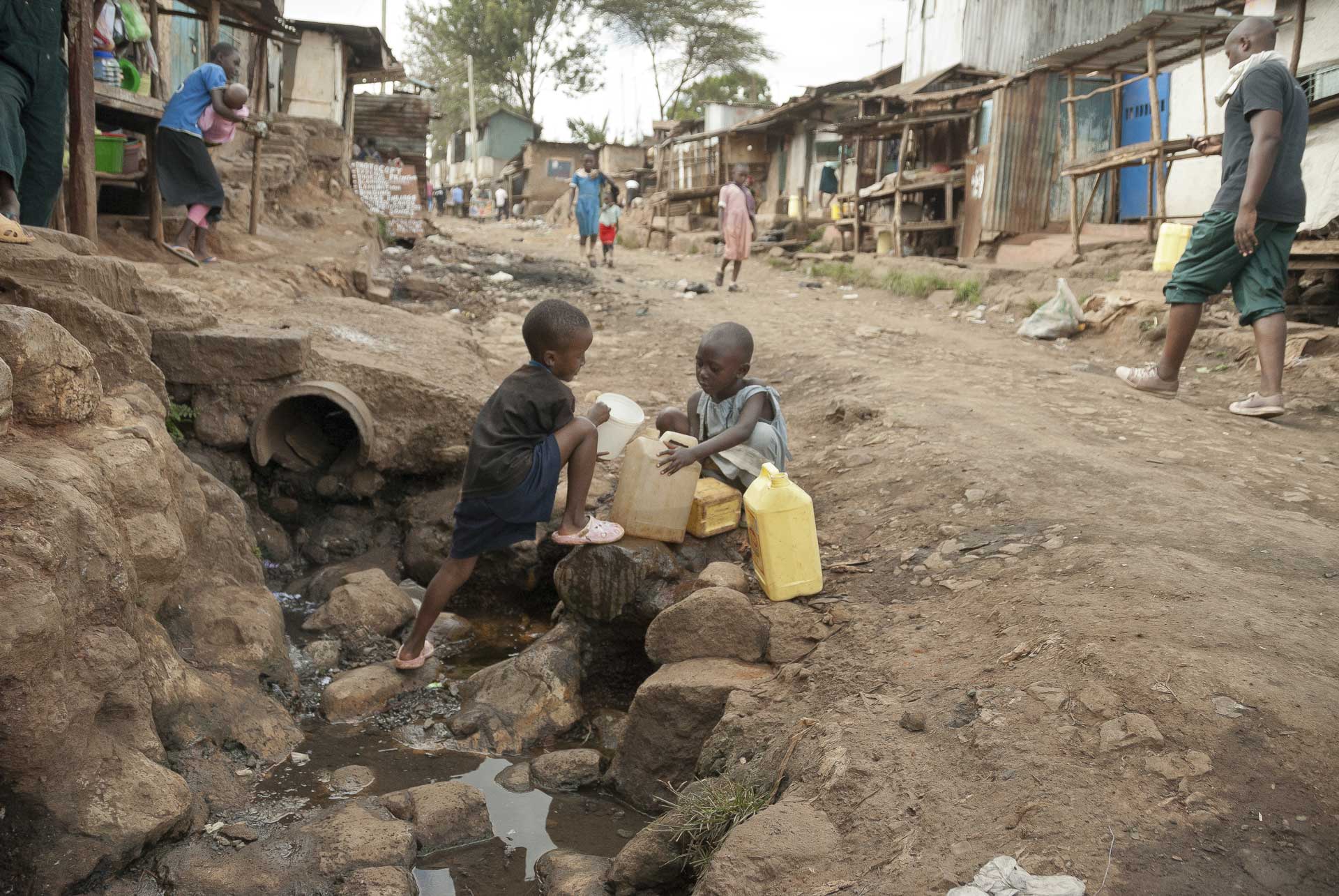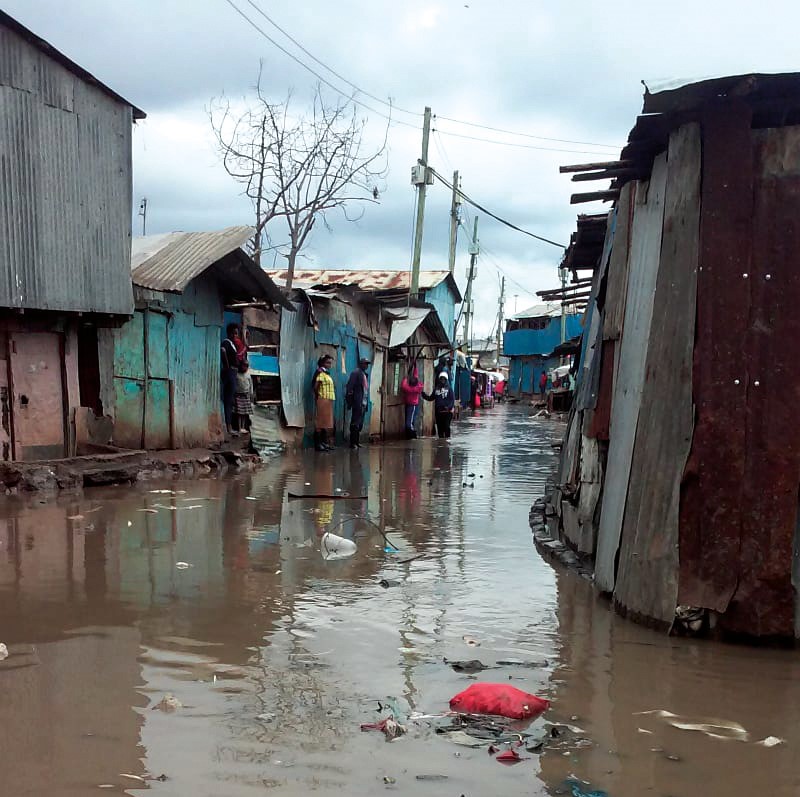Climate change is forcing young children into high-risk urban slums
Farming families migrate to informal settlements, where they face new climate issues
Farming families migrate to informal settlements, where they face new climate issues
 Photo: Courtesy of Vlad Karavaev/Shutterstock
Photo: Courtesy of Vlad Karavaev/Shutterstock
In 2013, a devastating drought in Kenya forced small-scale farmers across the country to abandon their land and move to towns and cities. This happened in a country where 84% of the land was already in zones classified as arid or semi-arid (International Organization for Migration (IOM), n.d).
This drought wasn’t a one-off. Since 2013, UN agencies have repeatedly raised alerts about low rainfall and associated indicators like malnutrition in Kenya (for example, the call for action in 2019 by the Food and Agriculture Organization, UNICEF and the World Food Programme). Flooding is also a concern in the Rift Valley, which cuts through the west of the country from north to south. Rising lake waters there have submerged homes and businesses (Baker, 2021).
For families around the world whose agricultural livelihoods have been devastated by changing and extreme weather, moving to urban areas is often the only option. In low- and middle-income countries like Kenya, these families often end up in informal settlements, also known as slums. Some of those affected by the 2013 drought moved to Mukuru, a large informal settlement in Nairobi.
Globally, approximately one billion people classified as “urban poor” – over a third of them infants, children and adolescents – live in informal settlements. These are neighbourhoods built without permission, and often in contravention of planning and zoning regulations.
Daily life is arduous in informal settlements. Most residents live in shacks made from poor-quality or inappropriate materials. These homes are not connected to water or sewerage networks, and they are often illegally connected to electricity networks. Often there is poor access to healthcare. Slum residents also lack housing security and are at constant risk of eviction.
Recent arrivals to slums are generally at even greater disadvantage than longer-term residents, who are more likely to have familial and social support systems in the neighbourhood. And since displaced people can usually bring little with them, they gravitate towards the most marginal areas of informal settlements, where rents are cheapest.
Having been forced by climate change to migrate to slums, families then find that climate change exacerbates the risks and challenges of living there.
The daily grind of being a parent in inadequate housing – trying to source clean water, deal with waste and excreta, and generally keep children safe and clean – can put extreme stress on mental health (Bartlett, 2021). Parents may become anxious and depressed, seriously affecting the quality of care they can give young children (Patel and Arthur, 2003).
‘The daily grind of being a parent in inadequate housing – can put extreme stress on mental health.’
Urban slums are often built on land that has been deemed unsuitable for more formal housing. The land may be polluted from previous uses, or at risk of landslides in prolonged periods of heavy rain (a risk which climate change exacerbates.) Heavy rain can also cause flash flooding in narrow streets blocked by uncollected waste, making some shacks uninhabitable and putting young children in particular at risk of drowning.
Slums are also disproportionately affected by extreme weather events because their housing is not solidly built to withstand the elements, and they lack adequate drainage and access for emergency vehicles. Flooding-related risks especially affect slums in cities that are frequently hit by cyclones or hurricanes, or located in coastal or water catchment areas or next to rivers (Bartlett et al., 2021).
Climate change also makes prolonged dry spells and heatwaves more likely. And in dry weather, fires can sweep quickly through densely packed housing. In dense urban areas, rising temperatures can also lead to heat stress, and increase vector- and water-borne diseases. Heat worsens air pollution too, further exacerbating conditions in informal settlements where unpaved roads and inadequate sanitation generate dust and airborne faecal matter.
All of this particularly affects very young children due to their immature organs and immune systems, their more rapid metabolism, and their physical susceptibility to dehydration and toxins. They’re growing up in conditions that are detrimental to their wellbeing and long-term development.
There is, however, a movement for change. Grassroots networks of the urban poor are growing all over the global south. They are often based on savings groups, which provide the means for the urban poor to upgrade their homes. Many use data collected by community members to negotiate with local government, finding ways to work collaboratively to upgrade infrastructure and services in their neighbourhoods.

Abandoned, partially submerged buildings, on foreshore of Lake Baringo, Kenya. Water in Rift Valley lakes has risen since 2011. Photo: Jack Makau/Muungano wa Wanavijiji
One such movement is Shack/slum Dwellers International (SDI), a federation active in 33 countries. Over the past decade their work has increasingly focused on reducing the impact of climate change on residents of informal settlements. SDI now includes resilience building in its discussions with municipal authorities.
In Kenya, informal settlements tend to be viewed narrowly as a housing issue. But SDI is trying to change that, through a participatory planning process for the Mukuru informal settlement. They helped develop a plan to show the government how to change a neighbourhood using climate-resilience strategies, not just by focusing on housing (Sverdlik et al., 2019).
Climate change is reshaping everyone’s world. As plans become reality in Mukuru, some of their newest residents – families displaced there from across the country – may have a chance for a safer future.
All references can be found in the PDF version of the article.
See how we use your personal data by reading our privacy statement.
This information is for research purposes and will not be added to our mailing list or used to send you unsolicited mail unless you opt-in.
See how we use your personal data by reading our privacy statement.